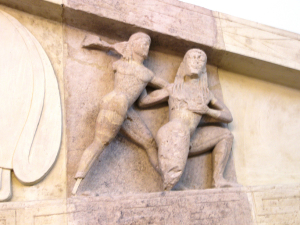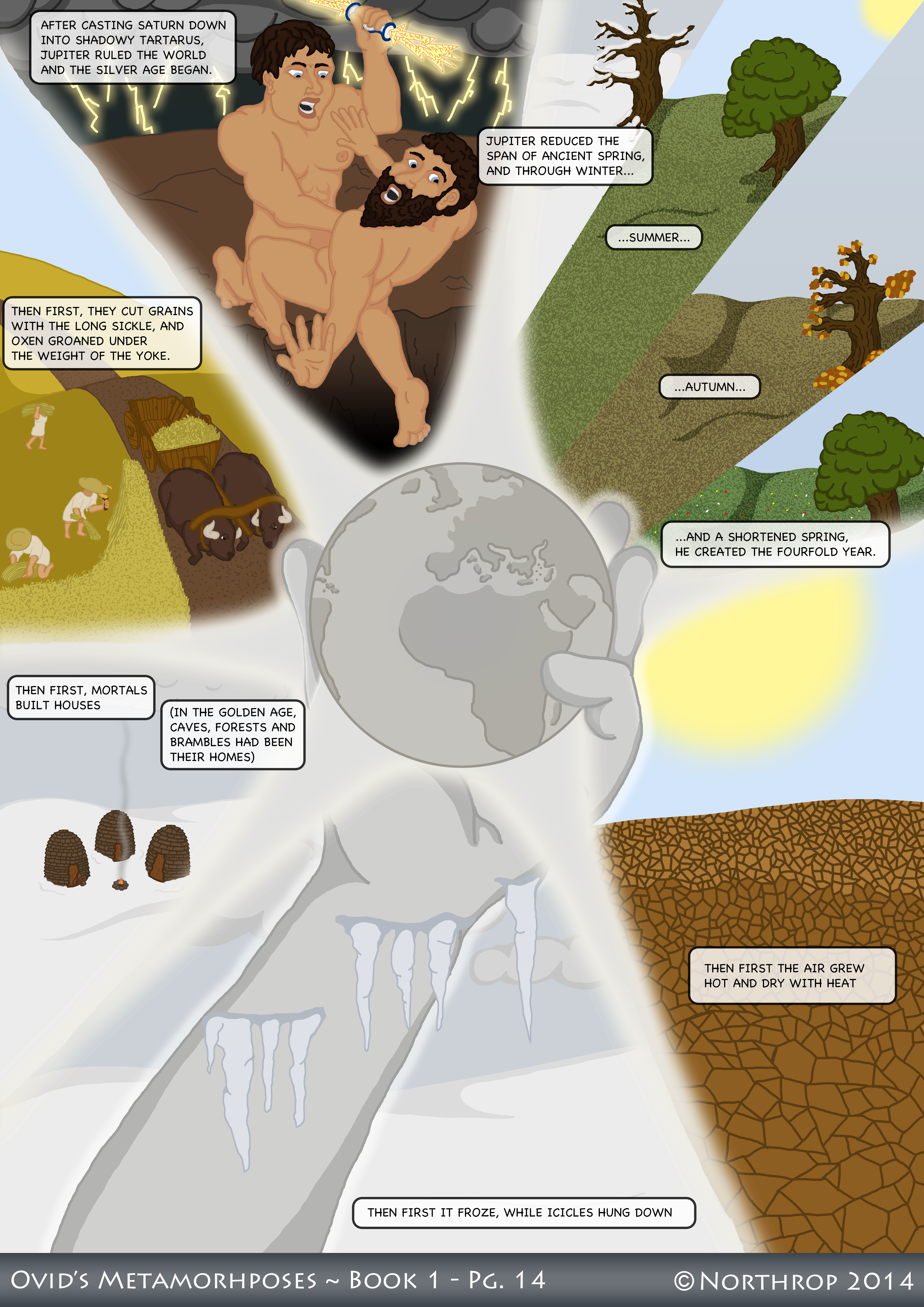Met. 1.113-24 – The Silver Age
POSTQUAM SATURNO TENEBROSA IN TARTARA MISSO
SUB IOVE MUNDUS ERAT, SUBIIT ARGENTEA PROLES,
AURO DETERIOR, FULVO PRETIOSIOR AERE.
IUPPITER ANTIQUI CONTRAXIT TEMPORA VERIS
PERQUE HIEMES AESTUSQUE ET INAEQUALES AUTUMNOS
ET BREVE VER SPATIIS EXEGIT QUATTUOR ANNUM.
TUM PRIMUM SICCIS AER FERVORIBUS USTUS
CANDUIT ET VENTIS GLACIES ASTRICTA PEPENDIT;
TUM PRIMUM SUBIERE DOMOS (DOMUS ANTRA FUERUNT
ET DENSI FRUTICES ET VINCTAE CORTICE VIRGAE);
SEMINA TUM PRIMUM LONGIS CEREALIA SULCIS
OBRUTA SUNT, PRESSIQUE IUGO GEMUERE IUVENCI.
AFTER SATURN WAS SENT INTO SHADOWY TARTARUS
THE WORLD WAS UNDER JOVE, AND THE SILVER RACE APPEARED,
LESSER THAN GOLD, MORE PRECIOUS THAN GLEAMING BRONZE.
JUPITER CONTRACTED THE TIME OF ANCIENT SPRING
AND THROUGH WINTER, SUMMER, UNEQUAL AUTUMNS
AND A BRIEF SPRING, HE WROUGHT THE FOURFOLD YEAR.
THEN FIRST THE AIR BURNED WITH DRY HEAT
AND WHITENED AS ICESICKLES HUNG IN THE WINDS;
THEN FIRST THEY ENTERED HOUSES (THEIR HOMES HAD BEEN CAVES
AND DENSE THICKETS AND CLUSTERS OF BRANCHES FASTENED WITH BARK);
THEN FIRST THE SEEDS OF CERES WERE SOWN IN LONG FURROWS,
AND THE YOUNG OXEN GROANED UNDER THE WEIGHT OF THE PLOUGH.
The Silver Age: not as good as Gold, but a good deal better than Bronze! Personally, I had fun with this page. It’s not every day you get to draw someone shoving a lightning bolt into another dude’s face, afterall…
Now, I don’t know what you’re thinking – that would be absurd (not to mention, a gross invasion of privacy). However, I can hazard a guess that some are perplexed by Jupiter’s lack of a beard in the first panel. Well, he’s young; he’s just barely old enough to wield that bolt, and he’s already setting himself up for future therapy by sending his no-good father to hell. Before anyone shouts “anachronism”* at my imposition of Jovian beardlessness on the masses, just let me say: I didn’t invent this. I’ve actually based the first panel on a part of the pediment sculpture group from the Temple of Artemis at Corfu. The temple, which was probably involved in some kind of coming-of-age rites, features a series of scenes from mythology, all centred around the theme of parents + children + violence. The imagery makes sense for coming-of-age ceremonies, where the childen must ritually ‘overcome’, even ‘conquer’ their parents (this is Freudian psychology at its finest, people). While Perseus slaying Medusa, whose gore gives birth to Pegasus, is the centrepiece, a little Zeus (Jupiter) is seen defeating a little Kronos (Saturn) in the corner:
 It’s a fitting image; Jupiter’s reign beginning is the ultimate son-surpassing-father story of Greco-Roman mythology. The anxieties caused by the notion that sons must one day surpass their fathers can be seen throughout ancient literature: Oedipus is the obvious example, but a twisted take on the same theme can be seen in Orestes’ slaying of his mother to avenge his father in the Oresteia. Of course, Jupiter himself is concerned too; he purposefully does not rape the goddess Thetis (what pleasant fellow, huh?) because he is fearful of a prophesy that her son will be greater than his father (he gets the hero Peleus to do it instead. And that’s how Achilles is born… yeah…)
It’s a fitting image; Jupiter’s reign beginning is the ultimate son-surpassing-father story of Greco-Roman mythology. The anxieties caused by the notion that sons must one day surpass their fathers can be seen throughout ancient literature: Oedipus is the obvious example, but a twisted take on the same theme can be seen in Orestes’ slaying of his mother to avenge his father in the Oresteia. Of course, Jupiter himself is concerned too; he purposefully does not rape the goddess Thetis (what pleasant fellow, huh?) because he is fearful of a prophesy that her son will be greater than his father (he gets the hero Peleus to do it instead. And that’s how Achilles is born… yeah…)
It’s fitting that Jupiter should headline the Silver Age here: Vergil’s version, which immediately preceded Ovid’s, had reframed Hesiod’s version as the pivotal moment of transformation for human-god relations. Essentially, Saturn was just letting humans laze around, getting everything for free in the Golden Age. Jupiter introduced labour to humanity, and hardened men by their toil. Ovid’s version follows Vergil’s (Hesiod had focused on the dispositions of the mortals themselves, while the Roman poets perferred to focus on the conditions of their lives), but twists it. Everything was grand and happy in the Golden Age; Jupiter’s overthrow of Saturn makes everything bad come to humanity – with no real justification! His ascension to the throne and reforms to the year are ripped from their context in previous poets. You get nothing of the war between the gods and the Titans, nothing of Saturn’s cruelty to his children, nothing arguing for necessity for the change. So, while a Roman reader might well recall that the reasons given in Hesiod and Vergil, Ovid disquiets the traditional understanding by erasing the huge, cosmic story; he leaves us with only mortals who had lived in peace and freedom, being forced into work and toil. It is probably not an accident that Ovid emphasises Jupiter’s reforms to the calendar as the cause of mortal suffering; Julius Caesar, the adoptive father of Augustus, had recently implemented possibly the most important calendar reform in recent history (for everything about that, including its cultural impact, be sure to read Denis Feeney’s book, Caesar’s Calendar). As we saw last week, Augustan poets liked to paint the new regime as a return to the Golden Age. However, the equally common comparison between Augustus and Jupiter, combined with the echo of Julius Caesar in the reform to the year, makes this part of the Myth of Ages still more political. I certainly don’t think Ovid is an idealist or a revolutionary; he has no illusions of the period before Caesar and Augustus as any kind of Golden Age; he’s no Cato, with a heart bleeding for the Republic. Instead, I think his purpose here is to play his poetry off against imperial propaganda. It’s a game he loves to play (as we’ll see later in the poem); Augustus says he is returning Rome to the Golden Age, while Ovid points out that, if anything, he and his father are Jupiter in the Silver Age. No matter how clever Augustan propaganda is, Ovid has to be just that much cleverer. No wonder he got exiled…
* I made my views on anachronism vis-a-vis the Metamorphoses known in a footnote last week, anyway.

Discussion ¬